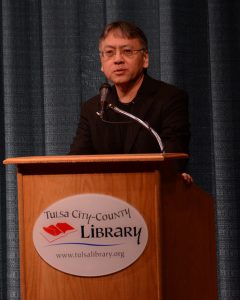Kazuo Ishiguro
Biography
In an interview with The Paris Review, Kazuo Ishiguro admits that his Japanese is ‘awful’, having left Nagasaki at age five when his family moved to Surrey. Born in 1954, he first visited Japan again as an adult over three decades later, and currently lives in London. His thesis for his creative-writing MA at the University of East Anglia became his first novel, A Pale View of Hills (1982). Following its success, he became a full-time writer and a year later, a British citizen. TheRemains of the Day (1989), his third and perhaps most famous novel, won the Man Booker Prize and was adapted into a successful film. He has written seven novels, including Never Let Me Go (2005), adapted into a film of the same name; short fiction; lyrics; and screenplays. In 2017 Ishiguro won the Nobel Prize for Literature.
Ishiguro’s novels are preoccupied by memories, their potential to digress and distort, to forget and to silence, and above all to haunt.
—James Procter
Writing

On awarding him the Nobel Prize for Literature in October 2017, the Swedish Academy said that Ishiguro ‘in novels of great emotional force, has uncovered the abyss beneath our illusory sense of connection with the world’. Never Let Me Go (2005) is one such novel, a dystopian examination of the relationship between the personal and the institutional that has been called one of the ‘central novels of our age’.
All of Ishiguro’s novels feature thematic concerns such as anxiety about the future, fear of desertion, the fallibility of human connection, and the intersections of memory and regret. He develops these themes through the deft use of narrative voice, achieving ‘a type of impersonation, a kind of camouflaging of the writer’s authority and hence his responsibility’. Ishiguro has worked with various forms and settings, moving from the post-World War II Japanese locations of his first two novels to capturing early-twentieth-century English restraint and class-based ‘subsumption of life by work’ in Remains of the Day (1989). His work frequently deals with individuals’ relations to power and are often set in a pre- or post-war period, which he argues is the ideal context in which to explore the ‘business of values and ideals being tested.’
The Guardian and the BBC labelled Ishiguro a British author upon the announcement of the news of his Nobel Prize. In a 1989 interview, however, Ishiguro said, ‘I think differently, my perspectives are slightly different [to the English].’ He went on to note that his relationship with England is complicated by his Japanese heritage: ‘There is a big difference between someone in my position and someone who has come from one of the countries that belonged to the British Empire’.
—Chelsea Haith
Cite this: Haith, Chelsea. “[scf-post-title].” Postcolonial Writers Make Worlds, 2017, [scf-post-permalink]. Accessed 28 January 2022.
